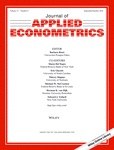

Dinand Webbink
Key publications

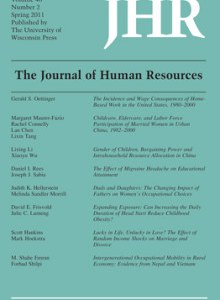
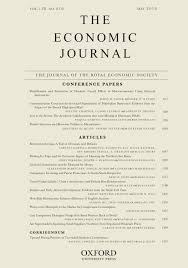
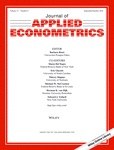
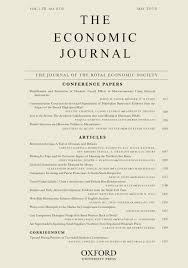
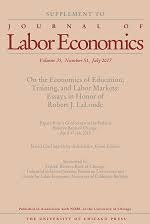
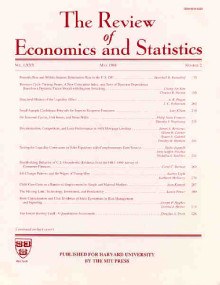
List of publications
Bolhaar, J., Kuijpers, S., Webbink, D. and Zumbuehl, M. (2024). Does replacing grants by income-contingent loans harm enrolment? New evidence from a reform in Dutch higher education Economics of Education Review, 101:.
Kapoor, S., Oosterveen, M. and Webbink, D. (2021). The price of forced attendance Journal of Applied Econometrics, 36(2):209--227.
Cabrera, J. and Webbink, D. (2020). Do higher salaries yield better teachers and better student outcomes Journal of Human Resources, 55(4):1222--1257.
Balart, P., Oosterveen, M. and Webbink, D. (2018). Test scores, noncognitive skills and economic growth Economics of Education Review, 63(April):134--153.
Webbink, D., \van Erp\, J. and \van Gastel\, F. (2018). The Effect of Media Exposure of Suspects on Solving Crime Economic Journal, 127(600):547--570.
Peter, N., Lundborg, P., Mikkelsen, S. and Webbink, D. (2018). The effect of a sibling's gender on earnings and family formation Labour Economics, 54:61--78.
Gerritsen, S., Plug, E. and Webbink, D. (2017). Teacher quality and student achievement: Evidence from a sample of Dutch twins Journal of Applied Econometrics, 32(3):643--660.
Gerritsen, \.(., Webbink, D. and \ter Weel\, B. (2017). Sorting Around the Discontinuity Threshold: The Case of a Neighbourhood Investment Programme De Economist, 165(1):101--128.
Misheva, V., Webbink, D. and Martin, N. (2017). The effect of child maltreatment on illegal and problematic behavior: new evidence on the ‘cycle of violence’ using twins data Journal of Population Economics, 30(4):1035--1067.
Akcomak, S., Webbink, D. and \ter Weel\, B. (2016). Why Did the Netherlands Develop So Early? The Legacy of the Brethren of the Common Life Economic Journal, 126(593):821--860.
Koning, P., Webbink, D. and Martin, N. (2015). The Effect of Education on Smoking Behavior: New Evidence for Smoking Durations of a Sample of Twins Empirical Economics, 48(4):1479--1497.
\van der Steeg\, M., \van Elk\, R. and Webbink, D. (2015). Does intensive coaching reduce school dropout? Evidence from a randomized experiment Economics of Education Review, 48(Okt 2015):184--197.
Hidalgo, D., Oosterbeek, H. and Webbink, D. (2014). The impact of training vouchers on low-skilled workers Labour Economics, 31:117--128.
Plug, E., Webbink, D. and Martin, N. (2014). Sexual Orientation, Prejudice and Segregation Journal of Labor Economics, 32(1):123--159.
Webbink, D., Vujic, S., Koning, P. and Martin, N. (2013). Why are criminals less educated than non criminals? Journal of Law, Economics, and Organization, 29(1):115--144.
Zubanov, \.(., Webbink, D. and Martin, N. (2013). The effect of schooling on problem drinking: Evidence from Australian twins Applied Economics, 45(12):1583--1599.
Webbink, D., Vujic, S., Koning, P. and Martin, N. (2012). The effect of childhood conduct disorder on human capital accumulation Health Economics, 21(8):928--945.
Oosterbeek, H. and Webbink, D. (2011). Does studying abroad induce a brain drain Economica, 78(310):347--366.
\van Elk\, R., \van der Steeg\, M. and Webbink, D. (2011). Does the timing of tracking affect higher education completion Economics of Education Review, 30(5):1009--1021.
Webbink, D., Martin, N. and Visscher, P. (2011). Does teenage childbearing reduce investment in human capital? Journal of Population Economics, 24(2):701--730.
Hartog, J., Berkhout, P. and Webbink, D. (2010). Compensation for earnings risk under worker heterogeneity Southern Economic Journal, 76(3):762--790.
Leuven, E., Lindahl, M., Oosterbeek, H. and Webbink, D. (2010). Expanding schooling opportunities for 4-year-olds Economics of Education Review, 29(3):319--328.
Webbink, D., Martin, N. and Visscher, P. (2010). Does education reduce the probability of being overweight Journal of Health Economics, 29(1):29--38.
Noailly, J., Jacobs, B. and Webbink, D. (2010). Should the Government Intervene in the Market for Scientist and Engineers? Applied Economics Letters, 18(4):371--375.
Webbink, D., Martin, \NicholasG.\ and Visscher, \PeterM.\ (2008). Does teenage childbearing increase smoking, drinking and body size? Journal of Health Economics, 27(4):888--903.
Oosterbeek, H. and Webbink, D. (2007). Wage effects of an extra year of basic vocational education Economics of Education Review, 26(4):408--419.
Leuven, E., Lindahl, M., Oosterbeek, H. and Webbink, D. (2007). The effect of extra funding for disadvantaged pupils on achievement Review of Economics and Statistics, 89(4):721--736.
Belot, M., Canton, E. and Webbink, D. (2007). Does reducing student support affect scholastic performance? Evidence from a Dutch reform Empirical Economics, 32(2-3):261--275.
Webbink, D. (2007). Returns to university education: Evidence from a Dutch institutional reform Economica, 74(293):113--134.
Webbink, D. (2005). Causal effects in education Journal of Economic Surveys, 19(4):535--560.
Webbink, D. and Hartog, J. (2004). Can students predict starting salaries? Yes! Economics of Education Review, 23(2):103--113.
Oosterbeek, H. and Webbink, H. (1995). Enrolment in higher education in the Netherlands De Economist, 143:367--380.